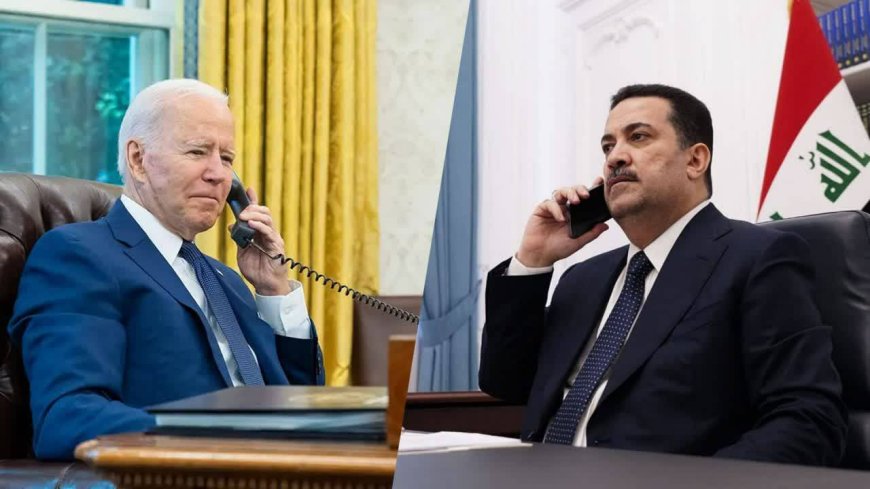Al-Sudani's Diplomatic Dance in Washington: Navigating US-Iraq Relations

By: H. Zaïm-Bashi
In a high-profile meeting on March 26, US Secretary of State Anthony Blinken and his Iraqi counterpart Fouad Hossein convened in Washington to discuss the upcoming meeting between Iraqi Prime Minister Mohammed Al-Sudani and President Biden, scheduled for April 15. This diplomatic démarche marks the second invitation extended by the White House to Prime Minister Al-Sudani. The initial invitation, extended in September 2023, was thwarted by the events of October 7 in the occupied Palestinian territories and the subsequent stance adopted by Iraqi resistance groups in support of Gaza’s 2.5 million civilians. Analysts believe that the suspension of the earlier invitation highlighted the complexities inherent in the Middle East’s evolving dynamics.
The Iraqi delegation shall embark on the fervor of the US presidential election campaigns, which are going on next November. Consequently, the prospects for substantial breakthroughs in Iraqi-American relations across diverse domains seem tempered by the prevailing circumstances in Washington, with ramifications poised to reverberate on both sides of the table. Anticipated deliberations from the Iraqi delegation are expected to encompass a spectrum of issues, including deliberations on the cessation of the US-led coalition's mandate in Iraq, delineating a definitive timeline for the withdrawal of US troops, strengthening ties between Baghdad and Erbil, addressing human rights concerns, and navigating the intricate terrain of US sanctions imposed on certain Iraqi citizens and financial institutions.
Furthermore, Al-Sudani's priorities are set to span a gamut of security and military imperatives, economic exigencies, and regional developments against the backdrop of the Gaza conflict. Of particular salience is the pressing need to heed Baghdad's call for an immediate cessation of Israeli aggression against Gaza, given the ominous specter of spiraling tension in the Middle East region. Although the precise tally of American troops stationed in Iraq remains elusive, estimates peg this figure at approximately 2500 personnel. The Iraqi authorities have steadfastly advocated for the expulsion of these forces. Notably, during the tenure of Iraq's former Prime Minister Mustafa Al-Kadhimi, there was a nominal reduction in the number of US troops and a change in their legal designation from'military' to 'advisory' status.
Nevertheless, the Iraqi coalition government, operating within a united Shiite coordination framework, remains resolute in its demand for a complete withdrawal or, failing that, a substantial downsizing of the American military presence. It is within this context that the primary focus of Al-Sudani's diplomatic mission assumes paramount importance.
On the other hand, noteworthy is Washington's persistent deferral of this Iraqi national demand, citing the lingering specter of ISIS as a pretext. The US envoy to Iraq has alluded to the ongoing threat posed by ISIS, thereby vindicating the retention of American forces within the Arab country. Further complicating the bilateral ties are the economic entanglements between Iraq and Iran. These entail exemptions facilitating the importation of electricity and gas from Iran, alongside the conundrum of sanctions imposed on Iraqi financial institutions due to currency transactions with Iranian bank sectors. The exemptions pertaining to electricity imports from Iran are subject to a 120-day period, with the US administration having extended this dispensation on 21 occasions since its inception in 2018.
Observers argue that the broader US agenda seeks to sever Iraq's energy ties with Iran. However, pragmatic considerations underscore the insurmountable challenge of weaning Iraq off its dependence on Iranian electricity imports. Concurrently, rumblings of potential financial strictures by the US Treasury Department against Iraqi banks loom large. Notably, instances of punitive measures, such as the denial of state currency access to 14 Iraqi banks, underscore the gravity of this fiscal conundrum. Also, the Americans are poised to press for concessions during this diplomatic parley. Central to this is their effort to maintain the presence of military advisors within Iraqi borders. The specter of ISIS’ resurgence, notably accentuated in the aftermath of the terrorist assault targeting Moscow’s concert hall, serves as a dubious rallying cry for sustaining US military footprint. Moreover, Iraq's strong ties with Iran, the escalating tensions between the Israeli regime and the Iran-led Axis of Resistance, add complexity to the prospects of successful Iraqi mediation between Tehran and Washington.
In conclusion, Al-Sudani’s diplomatic foray holds profound implications at both the domestic and regional levels. Against the backdrop of divergent objectives between Washington and the resistance axis, any substantive rapprochement appears elusive. The core question here is whether Al-Sudani can navigate the thorny issue of American military presence on Iraqi soil, safeguarding the nation's political sovereignty and independence, or whether he may be swayed by American overtures to maintain the status quo. The ensuing diplomatic tango promises to be fraught with nuance and significance, with far-reaching implications for the trajectory of Baghdad-Washington relations in the turbulent Middle Eastern landscape.













































